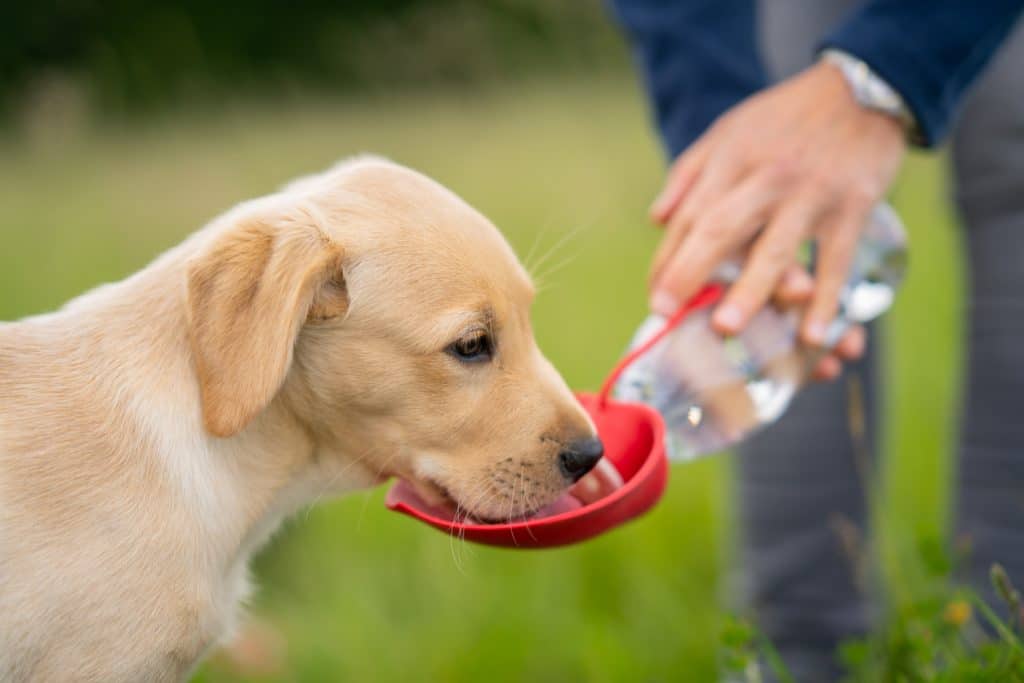Ouch! You’ll know if you have strep throat—but can our dogs catch it too? The bacteria that causes strep throat is called Streptococcus and, according to Nemours Children’s Health, this is the most common type of bacteria seen in throat infections.
This bacterial infection causes symptoms such as a sore throat and pain when swallowing, swollen and red tonsils, tiny red spots on the top of your mouth, inflamed glands in the neck, and fever. Also not-so-great? Strep throat is highly contagious.
The throats of our dogs are very similar to our own. They too have elements such as a larynx, tonsils, and vocal cords. So, does this mean dogs can also get strep throat? In simple terms, yes, they can. However, canines don’t experience this infection in the same way as humans. For starters, the symptoms are generally different—and they’ll have signs such as coughing, gagging, and abscesses.
If you’ve got a nasty case of strep throat, you needn’t avoid your pooch until it’s cleared up. “It’s extremely unlikely for your dog to get sick with strep from you, and vice versa,” explains Dr Lindsay Butzer, DVM, and partner at PetMeds. Phew!
Generally, symptoms will ease up on their own.
But, “if you notice signs of respiratory distress such as coughing, if it seems like they’re struggling to swallow, or they have a temperature over 103°F (39°C), it’s prudent to take your dog to the vet for an exam,” Butzer urges.
Dog Strep Throat Symptoms
Some signs of strep throat in dogs are the same as those in humans—but others are notably different. Let’s look at how this infection can affect our pets.
- Sore throat. Your pooch’s throat isn’t immune to feeling painful, tender, and irritated.
- Coughing. This is typically caused by feelings of irritation and soreness.
- Lip licking. Dogs may lick their lips due to discomfort or as a way to let you know something’s up.
- Lack of appetite. Your canine will likely not feel like eating if they know that swallowing will hurt.
- Dehydration. Swallowing liquids can also be painful for your pooch, but a lack of fluid intake can lead to dehydration.
- Gagging. Dogs can’t understand why their throat is hurting, so they might gag in an attempt to get rid of the pain and discomfort.
- Abscesses. These can arise as your dog’s immune system fights the bacteria infection.
- Fever. This symptom can occur as your dog’s immune system kicks into gear.
- Low energy. Your dog’s body will use any spare energy to fight off the infection, leaving little strength and stamina for other activities, such as walks and playtime.
Don’t panic if your furry friend’s symptoms are still around after a couple of days. “Strep throat typically lasts about a week in your dog,” reveals Butzer.
Can I Catch Strep Throat From My Dog?
As strep throat can be very easily passed from one human to another, it stands to reason that you might wonder if you can give it to your pet, and vice versa. However, while the infection found in dogs and humans has the same name—strep throat—two different strains of the bacteria are to blame in dogs and humans.
“The type of bacteria that usually affects dogs is different than the type that affects humans,” Butzer explains. “Specifically, the most common strain of bacteria that affects humans is known as Group A Streptococcus, while it’s the Group G variety that affects canines.”
Incidences of dog-to-human infections have previously been reported—although they are very few and far between. Indeed, Butzer states it’s highly unlikely you’ll catch the disease from your pet if they have it. The reason we typically don’t see human-to-dog crossover is because there are two different strains of the bacteria. So, while it remains possible that your dog caught the infection from a human, it remains quite unlikely.

iStock/yellowsarah
Strep Throat Treatments For Dogs
Nobody wants to see their dog in pain, right? So you’ll be pleased to know some approaches can help ease them through the infection. In fact, they’re very similar to those used to treat the condition in humans.
Prioritise hydration
Drinking will likely cause discomfort, but ensuring your dog stays hydrated is crucial. Not only can liquids help soothe a sore and inflamed throat, but their intake is critical in avoiding dehydration.
Cut down on walks and playtime
It’s important for even the most active dogs to rest when they’re poorly. The body needs to preserve as much energy as possible to fight the infection—so encourage your canine to rest when possible.
Give vet-prescribed medications
“If your vet sees fit, they may prescribe a course of antibiotics that will mitigate the symptoms and potential complications from the illness,” notes Butzer. Always obtain a prescription from your vet—do not give human strep throat medications to your pooch.
If one of your dog’s strep throat symptoms is coughing, you might be tempted to give them some human cough medicine to help ease those throat tickles. However, it’s essential to avoid doing so, as they often contain ingredients that are toxic to canines. There are plenty of other pet-friendly remedies that can help.

iStock/amriphoto
Can I Prevent My Dog From Getting Strep Throat?
The primary way dogs catch strep throat is from other animals. So if you have another dog (or a cat) in your home who has the infection, “keep infected animals quarantined from uninfected dogs,” Butzer says.
Unfortunately, there’s no magic swab we can wave or wipe across surfaces to see if there’s strep hanging about unseen in our homes or the park. Frustratingly, the only way you can recognise your dog is at risk is if you “know that another animal has strep,” states Butzer.
So, if your dog catches strep throat, it’s also important to “make sure no objects—such as water bowls, bones, blankets, etc—are shared during the period of infection,” she adds. You may also want to take a water bowl out on walks, so your dog doesn’t infect one that’s located in a shared space, or indeed get infected by one.
While dogs can receive vaccinations against diseases such as parvovirus, hepatitis, and rabies, “there is no vaccine to protect against strep throat in dogs,” reveals Butzer.
Do Other Pets Get Strep Throat?
Dogs (and humans!) aren’t the only animals susceptible to a bout of strep throat. According to The Centre for Food Security and Public Health at Iowa State University, species including cats, guinea pigs, horses, and even fish, can catch it. Although less frequently, monkeys, cattle, sheep, and goats can also be infected.
While strep throat can certainly prove uncomfortable for your pooch, it’s nothing to worry about in most cases. However, visit your vet immediately if your dog has a high temperature, is coughing, or has trouble swallowing—they can prescribe antibiotic medication to help clear the infection.


